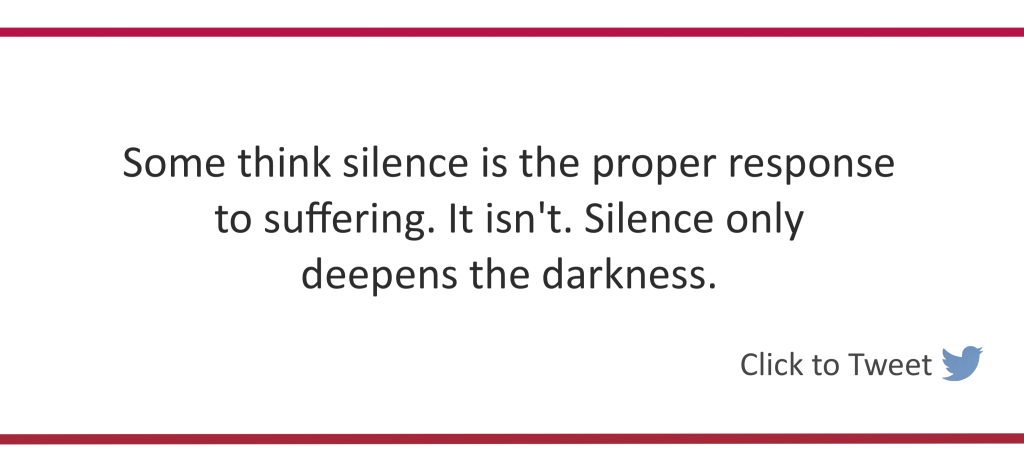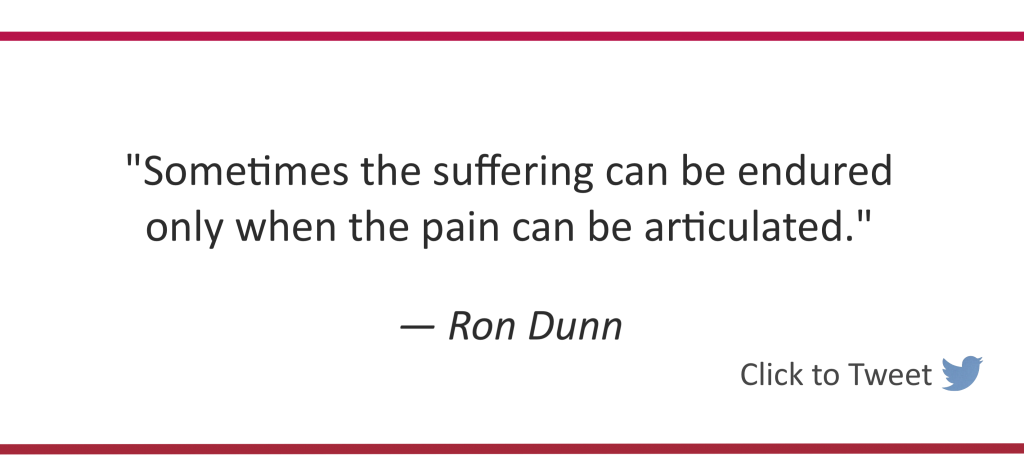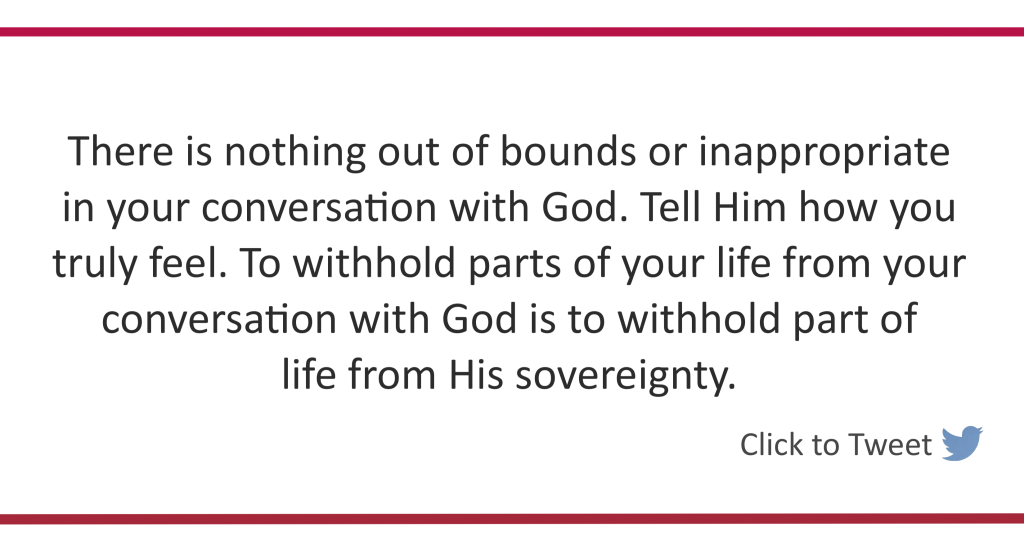Lilies, Bonus Lesson: Tell God How You Feel (Part 1)

In your pain and disappointment, are you telling God how you really feel? Or do you believe it would be improper to do so—perhaps because your emotions include feelings of frustration and anger at God?
Bonus Lesson: Tell God How You Feel
Have you ever stopped to think that the psalmists talked to God in their dark night of the soul—and when they did, they were real with God?
The psalmists didn’t hide their true feelings, even when their feelings included anger and frustration at God over their pain. They expressed lament, complaint, and protest.
The following are a few examples:
How long, O Lord? Will you forget me forever?
How long will you hide your face from me?
(Psalm 13:1, ESV)My soul thirsts for God,
for the living God.
When shall I come and appear before God?
My tears have been my food
day and night,
while they say to me all the day long,
“Where is your God?”
. . . .
Why are you cast down, O my soul,
and why are you in turmoil within me?
Hope in God; for I shall again praise him,
my salvation and my God.
. . . .
I say to God, my rock:
“Why have you forgotten me?
Why do I go mourning
because of the oppression of the enemy?”
(Psalm 42:2-3, 5, 9, ESV)
And there are many other psalms in which the writers talk about their personal and community suffering, including but not limited to: Psalm 22; 25; 39; 86; 88; 109.
Be Real
In When Heaven is Silent, Ron Dunn writes:
Actually, there are nearly as many psalms of lament, protest, and complaint as there are of praise and thanksgiving. But we do not hear much about them.
And that is strange because we think of the psalms as the hymnbook of the Church. … Why don’t we ever sing Psalm 88? I’ll tell you why. Listen:
Lord, God of my salvation,
I cry out before You day and night.
May my prayer reach Your presence;
listen to my cry. (vv. 1-2, HCSB).Now here’s his prayer, his cry:
For I have had enough troubles,
and my life is near Sheol.
I am counted among those going down to the Pit.
I am like a man without strength,
abandoned among the dead.
I am like the slain lying in the grave,
whom You no longer remember,
and who are cut off from Your care. (vv. 3-5, HCSB)It gets worse:
You have put me in the lowest part of the Pit,
in the darkest places, in the depths.
Your wrath weighs heavily on me;
You have overwhelmed me with all Your waves.
You have distanced my friends from me;
You have made me repulsive to them.
I am shut in and cannot go out.
My eyes are worn out from crying. (vv. 6-9, HCSB)Had enough? Let’s skip to the conclusion—maybe it turns out all right in the end.
From my youth,
I have been afflicted and near death.
I suffer Your horrors; I am desperate.
Your wrath sweeps over me;
Your terrors destroy me.
They surround me like water all day long;
they close in on me from every side.
You have distanced loved one and neighbor from me;
darkness is my only friend. (vv. 15-18)Try throwing that on your overhead this Sunday morning and see what it does to your praise service.
No, I’m not advocating that. It’s too depressing.
But it is real. [i]
Silence Deepens the Darkness
Do you cringe at the thought of being real with God—as real as the psalmist was in Psalm 88? Some people believe being this real with God is an invitation for Him to strike you with lightning, or a circumstantial equivalent. I disagree. Being real with God is Biblical. Dunn writes:
In some areas of Christianity, silence is considered to be the proper response to suffering. But silence only deepens the darkness. As we observed in [a section on Job], suffering has an isolating effect on the sufferer. He sees himself forsaken by God and forgotten by everyone else. To remain silent under the burden of suffering means to become more and more isolated.
But the Scriptures do not encourage silence or forbid speaking. If we learn anything from Job and Jeremiah and David, and even Jesus—who cried out on the cross, “My God, My God! Why have you forsaken me?”—it is that it is right and essential to express the pain of our souls. Sometimes the suffering can be endured only when the pain can be articulated.
. . . .
I learned a valuable and liberating truth in the dark. It’s okay to tell God how you feel. After all, He already knows. I’ve never told God anything He didn’t already know. I’ve never heard God gasp in surprise at anything I said. I’ve never heard God say in response to any confession, “I would never have believed that of you.” [ii]

Psalms of Darkness and Disorientation
Why weren’t the Psalms of lament and protest erased? Why did God include them in the Bible? If you were going to make Christianity attractive to someone, wouldn’t you try to skip these parts? Dunn continues:
In his theological commentary on Psalms, [Walter] Brueggemann divides them into Psalms of Orientation and Psalms of Disorientation. He finds it curious that the Church, in a world that is increasingly experienced as disoriented, continues to sing almost exclusively songs of orientation.
It is my judgment that this action of the church is less an evangelical defiance guided by faith, and much more a frightened, numb denial and deception that does not want to acknowledge or experience the disorientation of life. The reason for such relentless affirmation of orientation seems to come, not from faith, but from the wishful optimism of our culture.
Such a denial and cover-up, which I take it to be, is an odd inclination for passionate Bible users, given the large number of psalms that are songs of lament, protest, and complaint about the incoherence that is experienced in the world. At least it is clear that a church that goes on singing “happy songs” in the face of raw reality is doing something very different from what the Bible itself does.
Again let me make it clear that I am not suggesting we sing this psalm Sunday morning. I am suggesting that the Church needs to come to grips with the fact that disorientation is a legitimate spiritual experience many of its followers are enduring and that a place needs to be made for them in its ministry. [iii]

Everything Belongs in the Conversation of the Heart
It is not exercising doubt or unbelief to be honest with God. Walter Brueggemann writes:
“The use of these ‘psalms of darkness’ may be judged by the world to be acts of unfaith and failure; but for the trusting community, their use is an act of bold faith, albeit a transformed faith. It is an act of bold faith, on the one hand, because it insists that the world must be experienced as it really is and not in some pretended way. On the other hand, it is bold because it insists that all such experiences of disorder are a proper subject for discourse with God. There is nothing out of bounds, nothing precluded or inappropriate. Everything properly belongs in this conversation of the heart. To withhold parts of life from that conversation is, in fact, to withhold part of life from the sovereignty of God. Thus these psalms make the important connection: Everything must be brought to speech, and everything brought to speech must be addressed to God, who is the final reference for all of life.” [iv]
Did you pause and digest that profound statement?
You can write your own psalm of darkness and pour your heart out to God—all of it, not just the put-together, presentable part—because your experience of disorder is a proper subject for discourse with God. To communicate your dark feelings to God is not an act of unfaith or failure. It is, in fact, an act of bold faith!
There is nothing out of bounds or inappropriate in your conversation with God. Everything — even your feelings of anger and disappointment — belong in this conversation. If you were to withhold this part of your life from your conversation with God, it would be like trying to withhold part of your life from the sovereignty of God.

This paragraph by Brueggemann has stuck with me since I first read it in Dunn’s book over twenty years ago. I was in my early twenties then, entering the throws of a long, dark storm. I’m not sure how I would have responded to God had I not read this commentary by Brueggeman and Dunn. But I do know that reading it released me to be real with God. And being real with Him drew me close to Him, which ultimately enabled me receive His grace and strength and hope in my suffering.
Dunn continues, saying that he has studied the psalms of disorientation, and “never one time does the psalmist say he no longer trusts in God. Even in the darkest of the psalms God is perceived as one who is present in and attentive to the disorientations of life. And it is this kind of stubborn, protesting and lamenting faith that brings new life in deathly places.” [v]
–
More Tweetables
- The psalmists didn’t hide their true feelings, even when they included anger & frustration at God over their pain: http://bit.ly/tellgod
Tweet
- Some think silence is the proper response to suffering. It isn’t. Silence only deepens the darkness.
Tweet
- Scripture doesn’t encourage us to be silent in our suffering. Consider David, Job, Jeremiah, and the Psalms
Tweet
- “Sometimes the suffering can be endured only when the pain can be articulated.” — Ron Dunn
Tweet
- “I learned a valuable and liberating truth in the dark. It’s okay to tell God how you feel.” — Ron Dunn
Tweet
- There is nothing out of bounds or inappropriate in your conversation with God. Tell Him how you truly feel. To withhold parts of your life from your conversation with God is to withhold part of life from His sovereignty.
Tweet
- Expressing your negative feelings to God is not an act of unfaith and failure—but one of bold faith and trust.
Tweet
- It is right and essential to express to God the pain of our souls. We learn this from scripture.
Tweet
–
Questions: Are you telling God how you truly feel? Are you expressing your heart to Him, even if that includes lament or protest?
OTHER POSTS IN THIS SERIES
- God Still Clothes the Lilies: 10 Lessons for Seasons of Uncertainty (Part 1)
- God Still Clothes the Lilies, Lesson 1: Rest in God’s Sovereign Rule
- God Still Clothes the Lilies, Lesson 2: View Your Needs from Heaven’s Higher Perspective
- God Still Clothes the Lilies, Lesson 3: Hope in God Alone
- God Still Clothes the Lilies, Lesson 4: Trust in God and His Deliverance
- God Still Clothes the Lilies, Lesson 5: Be Confident in God (Part 1)
- God Still Clothes the Lilies, Lesson 5: Be Confident in God (Part 2)
- God Still Clothes the Lilies, Lesson 6: Wait Expectantly for God
- God Still Clothes the Lilies, Lesson 7: Receive God’s Enabling
- God Still Clothes the Lilies, Lesson 8: Focus on God, Not Your Problems
- God Still Clothes the Lilies, Lesson 9 (Part 1): Give Thanks & Praise, Even in This
- God Still Clothes the Lilies, Lesson 9 (Part 2): 3 Results of Your Worship
- God Still Clothes the Lilies, Lesson 10: Reflect on God’s Past Goodness
- God Still Clothes the Lilies, Bonus Lesson: Tell God How You Feel (Part 2)
__________________
[i] Ronald Dunn, When Heaven is Silent (Nashville, TN: Thomas Nelson, 1994), 126-127
When Heaven is Silent by Ron Dunn is one of the best books I’ve read on the subject of pain and difficulty. I highly recommend it! Dunn’s illustrations and down-to-earth writing style make the deepest Biblical truths and theological concepts not only understandable but applicable and life-changing.
Much of what Dunn shares, he learned from the pain he and his wife experienced in the years following the death of their teenage son. Dunn’s transparency is refreshing. In it, you find your own deep-seated, seemingly unutterable sentiments expressed on the page. With the skill of a surgeon, Dunn empathetically administers Biblical hope and healing to the wounds of your soul.
I read When Heaven is Silent in the beginning stages of my devastating illness. And it transformed the way I walked through those dark years. The first thing it changed was the way I viewed my loss. Through Dunn’s insights and masterful teaching, I saw with new depth how suffering can be a blessing in disguise. In fact, it was because of this book that I first began to write about my illness in 1994 as a package of pure gold, not the plague of severe loss I’d presumed it to be — a story I continue to share today. I highly recommend When Heaven is Silent!
[ii] Ibid., 130-131
[iii] Ibid., 132
[iv] Ibid., 132-133
[v] Walter Brueggemann, The Message of the Psalms (Minneapolis: Augsburg Publishing House, 1984), 80, quoted in Ronald Dunn, When Heaven is Silent (Nashville, TN: Thomas Nelson, 1994), 133

Disclosure of Material Connection: Some of the links in the post above are “affiliate links.” This means if you click on the link and purchase the item, Shades of Grace will receive an affiliate commission. Regardless, I only recommend products or services I use personally and believe will add value to my readers. I am disclosing this in accordance with the Federal Trade Commission’s 16 CFR, Part 255 “Guides Concerning the Use of Endorsements and Testimonials in Advertising.”






 “Natalie Grace Nichols is experiencing God’s grace and freely expressing it. My wife, Betty, and I thank God for the ministry of Jesus through Natalie.”
“Natalie Grace Nichols is experiencing God’s grace and freely expressing it. My wife, Betty, and I thank God for the ministry of Jesus through Natalie.” “I’m so thankful that God is raising up women like Natalie for a new generation, providing biblically balanced teaching, encouragement, and comfort for people who are enduring life’s trials.”
“I’m so thankful that God is raising up women like Natalie for a new generation, providing biblically balanced teaching, encouragement, and comfort for people who are enduring life’s trials.”